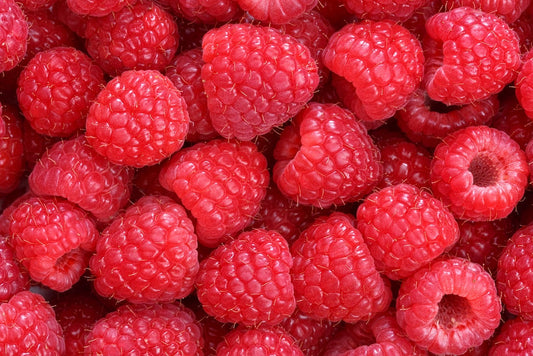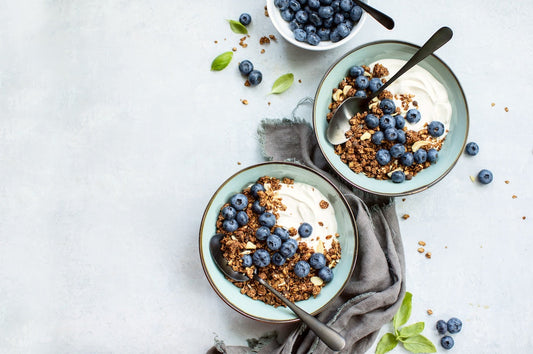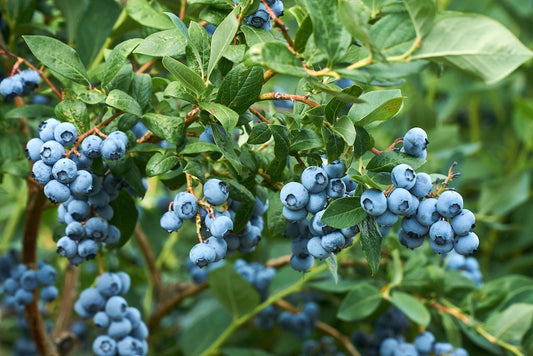Cravings make losing weight difficult for many people. But where do cravings come from in the first place? And what is the best way to satisfy the excessive hunger for sweet and salty foods in the evening? In this article, we will look at the physical and psychological aspects underlying food cravings and how knowing about them can help you lose weight in the long term.
Do you want to lose weight? Calculate your calorie requirement here
What causes cravings?
Most people are familiar with the craving for crisps while watching TV, sweet cake for a snack or chocolate after dinner. For some, it is just a slight craving, while for others, the craving can be much stronger. This is often due to a rapid increase in blood sugar levels – but this is not always the reason.
To understand how cravings arise, it can be useful to look at satiety. This is because satiety regulates food intake. In this way, it helps to keep your weight in a healthy range. However, the feeling of satiety is influenced by several factors.
The interaction between the brain, hormones and the digestive system
The human brain plays a central role in satiety on several levels. For one thing, signals from the stomach and other organs are transmitted to the brain.
This can be explained simply using the example of the stomach: if you eat a large portion for lunch, your stomach is stretched. This in turn causes the sensors to light up and prompts them to communicate with the brain via the nervous system. In this case: stop the hunger, we don't have much space left!
In the brain, the signals from the sensors are now processed and finally instructions are sent back in the form of hormones. This is how the brain communicates with the organs and the feeling of satiety occurs 1.
On the other hand, the reward system plays an important role. Here, too, hormones are involved. Dopamine, for example, is considered the happiness hormone. If you eat particularly sugary or fatty foods, dopamine is released2.
This is also the reason why we tend to reach for a bar of chocolate when we are in a bad mood: the brain craves happiness.
1. Blood sugar levels
But that's where the vicious cycle begins. Because if you give in to your craving, it will cause your blood sugar level to rise. That's because chocolate consists mainly of empty carbohydrates. The high sugar content and lack of nutrients cause your blood sugar to rise rapidly.
To compensate, the pancreas releases insulin – causing your blood sugar level to drop rapidly again, leaving you hypoglycaemic. This in turn makes you hungry – welcome to the vicious circle!
2. Nutrients
This is precisely where nutrients can help. This is because blood sugar levels are primarily driven by empty calories, such as foods that are high in sugar.
Eating plenty of fiber, complex carbohydrates and vitamins, on the other hand, has a positive effect on your blood sugar – avoiding excessive rises and falls in blood sugar and helping you escape the vicious cycle.
3. Hydration
An important aspect that is often underestimated is your body's water balance. If you don't drink enough, it can lead to a kind of hunger. Your body is asking for water – but the communication isn't that clear.
Instead, many people mistake the feeling of thirst for hunger. The worst thing you can do is reach for sugary or salty snacks. But that's exactly what many people do when they just want to have a “quick snack”. The trouble with that is that salt and sugar cause the body to become even more dehydrated – the craving for fluids continues to increase.
4. The role of sleep
That's why you should make sure to drink enough water first thing in the morning. That's because your body loses a lot of fluids during the night. But sleep is important for more reasons than that.
What's more, a lack of sleep can intensify the feeling of hunger. This happens for a number of reasons. For one thing, your mood may suffer, causing your brain to crave food. It's a classic trap of the reward system.
On the other hand, a lack of sleep has been shown to increase the release of the “hunger hormone” ghrelin. The hormone gets its name from its appetite-enhancing effect. Since it is linked to the circadian rhythm, it is significantly influenced by sleep 3.
This raises the question of how we can use this knowledge to avoid food cravings. It's best to take a closer look at the biggest influencing factor – nutrition.
Food cravings due to poor nutrition
Poor nutrition can not only unnecessarily delay the feeling of satiety, but can also explicitly stimulate the appetite. If you want to lose weight, this is obviously not in your favor.
Mistake 1: eating too little
Many people make a crucial mistake when trying to lose weight. They eat too little. Very few consider that this cannot work in the long term. Therefore, listen to your natural satiety.
Mistake 2: too few nutrients
So we have already arrived at the second mistake. It is about satiety. Since this is strongly dependent on the nutrients supplied, we should take a closer look at it.
As a rule of thumb, you can remember: fiber, complex carbohydrates, vitamins and minerals are very satisfying. A varied diet with colorful fruits and vegetables, whole grain products and healthy fats can help you lose weight.
The satiating effect of sugar and empty carbohydrates, on the other hand, is much more limited and short-lived. This is also why you should avoid white flour products and fast food when losing weight. This is because both are usually high in calories but low in nutrients. This causes your blood sugar to rise sharply, and in the worst case, can lead to food cravings.
Types of food cravings
You've probably already noticed that there are different types of cravings. Sometimes your body craves something sweet, other times salty snacks. But why is that?
Craving sweets
Your body usually craves chocolate, gummy bears, and the like when it's low on blood sugar. As we already know, blood sugar levels are a key factor in this.
Hypoglycemia can occur if you haven't eaten enough – or if your meals are too high in calories and too low in nutrients.
Craving salty foods
This type of craving can occur when you have a nutrient deficiency. For example, if your body is missing minerals such as sodium or potassium.
This can be caused by serious illnesses, such as adrenal gland or blood pressure problems or diabetes. However, in most cases, the cause is much less dramatic. One common trigger can be heavy sweating, for example, after you've been physically active.
Cravings in the evening
The most common cravings occur in the afternoon or evening. Especially when you're exhausted after work, your body craves simple rewards. So we've come full circle to the happiness hormone dopamine.
Why does cravings affect our weight loss success?
The reason why cravings have such a strong impact on your weight loss success is easy to explain. Wrong eating behavior causes you to consume too many calories.
This usually manifests itself in the form of a higher fat percentage in the body – you gain weight. This is precisely why it is so important to avoid constant hunger when losing weight in the long term. Now let's take a look at how you can do that.
Stop cravings: 5 tips & tricks for dealing with food cravings
To avoid cravings, a balanced diet is often a good start. But warm breakfasts and certain superfoods like oats can also help you lose weight in the long term. So, here are some top tips and tricks:
- Eat slowly and avoid unnecessary distractions. This will help you to better perceive your body's signals and avoid excessive calorie intake.
- Make sure you get enough fiber: oats and whole grain products are particularly good sources.
- Drink enough: a glass of water when you get up can work wonders.
- Go for a warm breakfast: a warm porridge in the morning is easy on your digestion and keeps you feeling fuller for longer.
- Choose colorful fruits and vegetables: they are particularly rich in healthy phytonutrients.
Read about five more reasons why you should go for a warm breakfast when losing weight.
A warm breakfast helps to fight cravings
You've probably noticed our tip to go for a warm breakfast. There are many reasons for this recommendation.
A pleasant warm porridge in the morning is easy on the digestion. It also helps to maintain a long-lasting feeling of satiety. This is due to the oats contained in the porridge. They are rich in complex carbohydrates, fibres such as beta glucan and healthy micronutrients.
Tasty organic porridge from Verival – try it now
Keep your insulin levels balanced and avoid food cravings
Keeping your insulin levels balanced can be a big help in avoiding food cravings and helping you lose weight.
To prevent your blood sugar from rising and falling too quickly, you should avoid foods that are high in sugar. This is easy to do with some products, but sugar is hidden in others. So we have listed some of the most common pitfalls:
- Sweetened cornflakes, cereals and muesli
- White bread and flour-based foods
- Fruit juices
- Muesli bars
- Sweetened fruit yoghurts
Of course, biscuits, cakes, ice cream and the like are much more obvious. It's best to check the ingredients on the back of the packet the next time you go shopping. If sugar is one of the first ingredients listed, it's best to leave it alone.
You can use sweeteners as an alternative to sweetening food and drinks. Artificial sweeteners like stevia, for example, do not affect your insulin levels 4.
But fresh fruit or dates can also provide the desired sweetness. Although they contain fructose, the many phytonutrients and fiber prevent a sharp rise in blood sugar 5.
Proteins – the enemies of cravings
Last but not least, proteins deserve a mention. Protein is more associated with muscle building, but it is also an excellent source of satiety. Both can help you lose weight.
A high-protein breakfast, such as porridge with protein-rich nuts and seeds as a topping, is a real satiety booster. In addition, a high-protein diet increases your fitness, especially if you exercise regularly, to accelerate weight loss.
That's why porridge is good for losing weight – read the article
Therefore, proteins should not be missing from your diet. We wish you good luck with losing weight!
- Elmadfa I, Leitzmann C. Nutrition of the human being. 6th ed. Eugen Ulmer; 2019.
- Hartmann H, Pauli LK, Janssen LK, Huhn S, Ceglarek U, Horstmann A. Preliminary evidence for an association between intake of high-fat high-sugar diet, variations in peripheral dopamine precursor availability and dopamine-dependent cognition in humans. J Neuroendocrinol. Published online December 2020. doi: 10.1111/jne.12917
- Morselli L, Leproult R, Balbo M, Spiegel K. Role of sleep duration in the regulation of glucose metabolism and appetite. Best Practice & Research Clinical Endocrinology & Metabolism. Published online October 2010:687-702. doi: 10.1016/j.beem.2010.07.005
- Anton SD, Martin CK, Han H, et al. Effects of stevia, aspartame, and sucrose on food intake, satiety, and postprandial glucose and insulin levels. Appetite. Published online August 2010:37-43. doi: 10.1016/j.appet.2010.03.009
- Bondonno NP, Bondonno CP, Ward NC, Hodgson JM, Croft KD. The cardiovascular health benefits of apples: Whole fruit vs. isolated compounds. Trends in Food Science & Technology. Published online November 2017:243-256. doi: 10.1016/j.tifs.2017.04.012
























